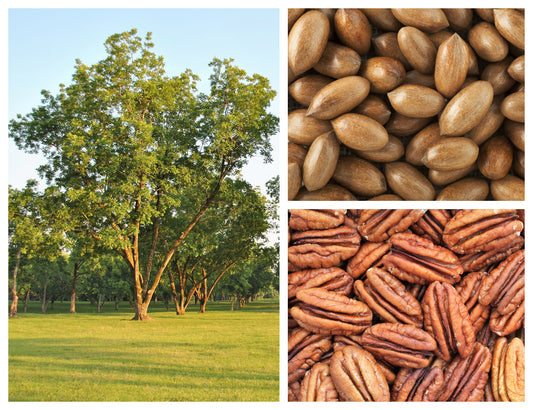



Free Shipping
Safe & Secure Payments
The Hardy Pecan Tree (Carya illinoinensis), known for producing some of the best-tasting nuts in North America, is a large deciduous tree native to the United States. Pecans are beloved for their rich, buttery flavor and versatility in cooking and baking, making them a staple in both savory and sweet dishes. With the "King Nut" variety, you can expect even larger nuts, offering exceptional yields and delicious, high-quality pecans. These trees thrive in well-drained soils and sunny areas, making them an excellent addition to orchards, large gardens, and even home landscapes. Hardy and long-lived, the Pecan Tree produces valuable nuts year after year, providing both beauty and productivity for decades.
Key Features:
Growing Information:
Light:
Pecan trees require full sun to grow strong and produce high yields. They need at least 6-8 hours of direct sunlight per day for optimal growth and nut production.
Soil:
Pecan trees prefer deep, well-drained, sandy-loam soil rich in organic matter. They perform best in slightly acidic to neutral soil (pH 6.0-7.5). While they are tolerant of various soil types, they do not do well in poorly drained or waterlogged areas, so good drainage is essential.
Planting Tips:
Start Pecan seeds indoors by soaking them in water for 24 hours to promote germination. After soaking, plant the seeds in pots with a high-quality, well-draining seed-starting mix, pressing them about 1 inch deep into the soil. Keep the pots in a warm, sunny spot and water regularly, ensuring the soil remains moist but not waterlogged. Germination may take 4-6 weeks. Once seedlings are large enough to handle and all risk of frost has passed, transplant them outdoors in a sunny spot with well-drained soil. Space trees 30-40 feet apart to allow for their expansive growth and canopy.
Watering:
While young trees require regular watering to establish strong roots, mature Pecan trees are fairly drought-tolerant. However, for the best nut production, it's recommended to water deeply during dry periods, especially in the summer months. Avoid overwatering, as it can lead to root rot and other fungal diseases.
Benefits:
Growing Zones:
The Hardy Pecan Tree is best suited for USDA Zones 6-9, making it ideal for regions with long, hot summers and mild winters. In colder climates (zones 5 and below), it may be more challenging to grow Pecans, as they require warmer temperatures to thrive and produce fruit.
How to Use in the Garden:
Conclusion:
The Hardy Pecan Tree (Carya illinoinensis) "King Nut" is a wonderful addition to any garden or orchard. Known for its large, flavorful nuts and impressive, long-lived growth, this tree offers both ornamental beauty and productive fruit. Its ability to thrive in a range of soil types and its drought tolerance once established make it an ideal choice for many climates. Whether you're looking to add a productive fruit tree to your landscape or cultivate a nut harvest for your family, the Hardy Pecan Tree provides delicious rewards for years to come. Enjoy fresh pecans, homemade pies, and a vibrant garden with this hardy, native tree!
حدِّد الخيارات

